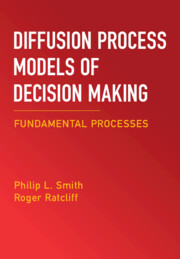Book contents
- Frontmatter
- Dedication
- Contents
- List of Figures
- Preface
- 1 Overview
- 2 Basic Concepts and Data
- 3 Sequential-Sampling Models of Decision Making
- 4 Obtaining Predictions for Diffusion Models
- 5 Empirical Assessment of Sequential-Sampling Models
- 6 Time-Varying Diffusion Models, I. Time Pressure, Urgency, Collapsing Boundaries, and Optimality
- 7 Diffusion Models for Time-Controlled Processing Tasks
- 8 Time-Varying Diffusion Models, II. Detection and Simple RT
- 9 Diffusion Processes Driven by Time-Varying Stimulus Representations in Visual Working Memory
- 10 Neural Diffusion Models, I. Network and Dynamical System Models
- 11 Neural Diffusion Models, II. Poisson Shot Noise and Related Models
- 12 Diffusion Models for Continuous-Outcome Decision Tasks
- 13 Response Confidence
- 14 EZ and Moment Models, Multialternative Decisions, and Expanded Judgment Tasks
- References
- Index
1 - Overview
Published online by Cambridge University Press: 26 October 2025
- Frontmatter
- Dedication
- Contents
- List of Figures
- Preface
- 1 Overview
- 2 Basic Concepts and Data
- 3 Sequential-Sampling Models of Decision Making
- 4 Obtaining Predictions for Diffusion Models
- 5 Empirical Assessment of Sequential-Sampling Models
- 6 Time-Varying Diffusion Models, I. Time Pressure, Urgency, Collapsing Boundaries, and Optimality
- 7 Diffusion Models for Time-Controlled Processing Tasks
- 8 Time-Varying Diffusion Models, II. Detection and Simple RT
- 9 Diffusion Processes Driven by Time-Varying Stimulus Representations in Visual Working Memory
- 10 Neural Diffusion Models, I. Network and Dynamical System Models
- 11 Neural Diffusion Models, II. Poisson Shot Noise and Related Models
- 12 Diffusion Models for Continuous-Outcome Decision Tasks
- 13 Response Confidence
- 14 EZ and Moment Models, Multialternative Decisions, and Expanded Judgment Tasks
- References
- Index
Summary
Chapter 1 provides an outline of the mathematical foundations of diffusion processes as models of Brownian motion in physics and the origins of diffusion models of decision making in psychology, along with their recent applications in disciplines like neuroscience and economics. The models assume that decisions are made by accumulating noisy evidence to decision criteria and provide a unified account of psychology’s two fundamental dependent variables of accuracy and response time. The chapter describes the origins of the models in efforts to understand why the speed and accuracy of decision making is inherently variable from one decision to the next. Contemporary diffusion models are the culmination of a body of theoretical development that extends back through the sequential-sampling models of the 1960s, signal detection theory, Wald’s sequential statistics, Thurstone’s law of comparative judgment, to Fechner’s study of just noticeable differences in the mid-nineteenth century. The chapter concludes with a summary of the organization of the book.
Information
- Type
- Chapter
- Information
- Diffusion Process Models of Decision MakingFundamental Processes, pp. 1 - 9Publisher: Cambridge University PressPrint publication year: 2025
